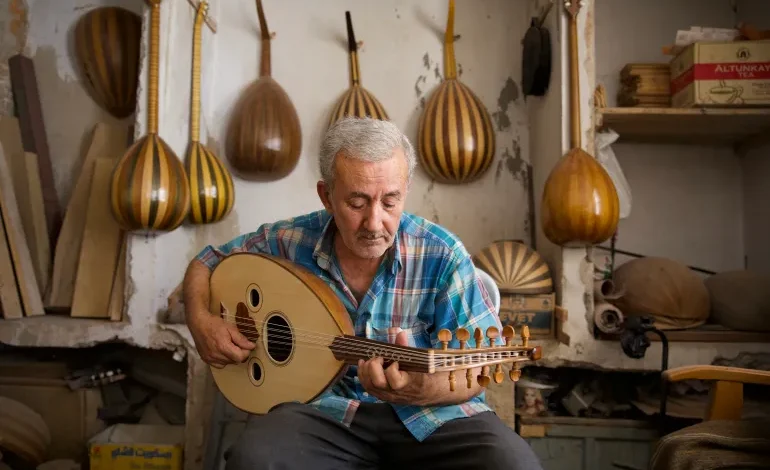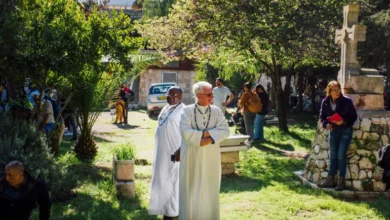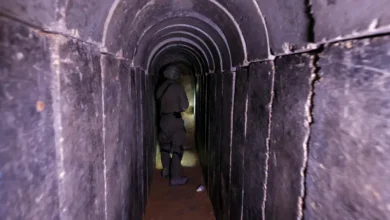In war and peace, the oud never leaves this Syrian musician’s side

In a small workshop where the scent of wood and sound of music blend, Hassan Hamza works to make one of the most important instruments in Arabic music.
The 67-year-old is one of the few artisans in northwestern Syria who still preserve the traditional craft of oud-making, which has endured the ravages of war for more than a decade.“The oud is a close and old friend of mine, and the connection between us is hard to put into words, especially when I embrace it close to my chest,” Hamza told Al Jazeera from his workshop in the town of al-Bab.
Syria is renowned throughout the Arab world for its musical heritage and oud craftsmanship.
What Hamza does is not simple. Significant skill is required to put the oud together, skill that he had to learn slowly over the years.
The oud, which is similar to a lute, is known for its pure tones and its unique, harmonious sounds, so much so that UNESCO added it to its Intangible Cultural Heritage of Humanity list in November, recognising its distinctive sound and meticulous handmade curves.
From hobby to profession
The skill of crafting an oud is often passed down within families, but Hamza did not inherit the profession from his relatives.
Instead, he began playing the oud as a hobby, something to do in his down time while he was studying at Aleppo University.After studying the French language and graduating from university, Hamza ended up working in an electrical repair shop. But still, the oud was by his side, a companion for when he wanted to relax. Eventually, he turned his passion into a profession and decided to start making the instrument that he had spent years playing.
“I started in 2004. It was a very challenging journey and experience,” Hamza said, referring to the process of crafting his first oud, a skill he taught himself. “But by the end, I was successfully able to make an oud that impressed my friends and family, who encouraged me to continue until I became one of the most renowned oud makers in the region.”After the war in Syria broke out, Hamza was forced to leave his city and workshop in 2012. He headed to Turkey, where he was a refugee for eight years, but he did not stop working with ouds.
“During my time in Turkey, I tried not to break away from my beloved profession. I helped several musicians, both Syrians and Turks, in setting up their own workshops for crafting ouds,” Hamza said.
“One of the key conditions I have for passing on my expertise to those interested in making ouds is that they must be skilled musicians,” Hamza added. “A musician can feel the soul of the oud, determine the right measurements for the musical instrument and craft it based on their intuition, unlike a mere craftsman who lacks the proficiency in playing.”
During his time in Turkey, Hamza was diagnosed with prostate cancer, and three years of treatment followed until he fully recovered.
He then decided to return to al-Bab in 2019, a year after it had been freed from ISIL (ISIS) rule in an operation by the Turkish military and opposition Syrian National Army.
“I returned to my city with even more energy than before and quickly set up my workshop again to resume my work,” Hamza said. “The desire to come back to my craft was due to the many people who contacted me to acquire the ouds I create.”The emotions of the oud
Hamza said the craft of making ouds relies heavily on the quality of the wood used.
The back of the oud requires hard, durable wood, such as juniper or ebony. The front of the oud uses spruce, a lighter wood. The strings are often sourced from outside the country.
“For me, I prefer using juniper and ebony wood because they are abundant in our region and are perfect for crafting the back of the oud,” Hamza said. “I avoid relying on imported wood because the oud is part of Syria’s history, and we should depend on locally crafted wood.”
“The process of crafting an oud takes two weeks to a month depending on the type of wood used, and their prices range from $300 to $1,000,” he added.
During his leisure time, Hamza makes sure he has enough time to immerse himself in a tranquil corner, surrounded by the scent of wood and the oud strings he has handcrafted.
In those moments, he finds peace and harmony. The outside world disappears, and the oud becomes connected to his soul and creativity.
“The worst thing for the oud is leaving it untouched for an extended period because it is a sensitive musical instrument and neglecting it affects its quality,” Hamza said.
Any oud in Hamza’s possession does not need to worry about neglect. He regularly plays the oud with some of his friends and amateur musicians, and his workshop is a haven for aspiring oud players.
“Playing the oud and listening to music is a special mental comfort for those who are skilled in playing and love this instrument,” said Abdul Hadi Shareef, an amateur musician and one of Hamza’s friends. “When they embrace the oud, a dialogue is formed, resulting in music that captivates listeners.”
Shareef said he has been fond of music since he was young, attending concerts in Aleppo and Damascus before the start of the Syrian revolution in 2011. Today, he visits Hamza’s workshop almost daily to play the oud and listen to music.
“Music allows us to convert our emotions and express them sincerely and honestly,” Shareef said. “It is complete nourishment for the soul and a language that expresses without words what is inside a person.”










